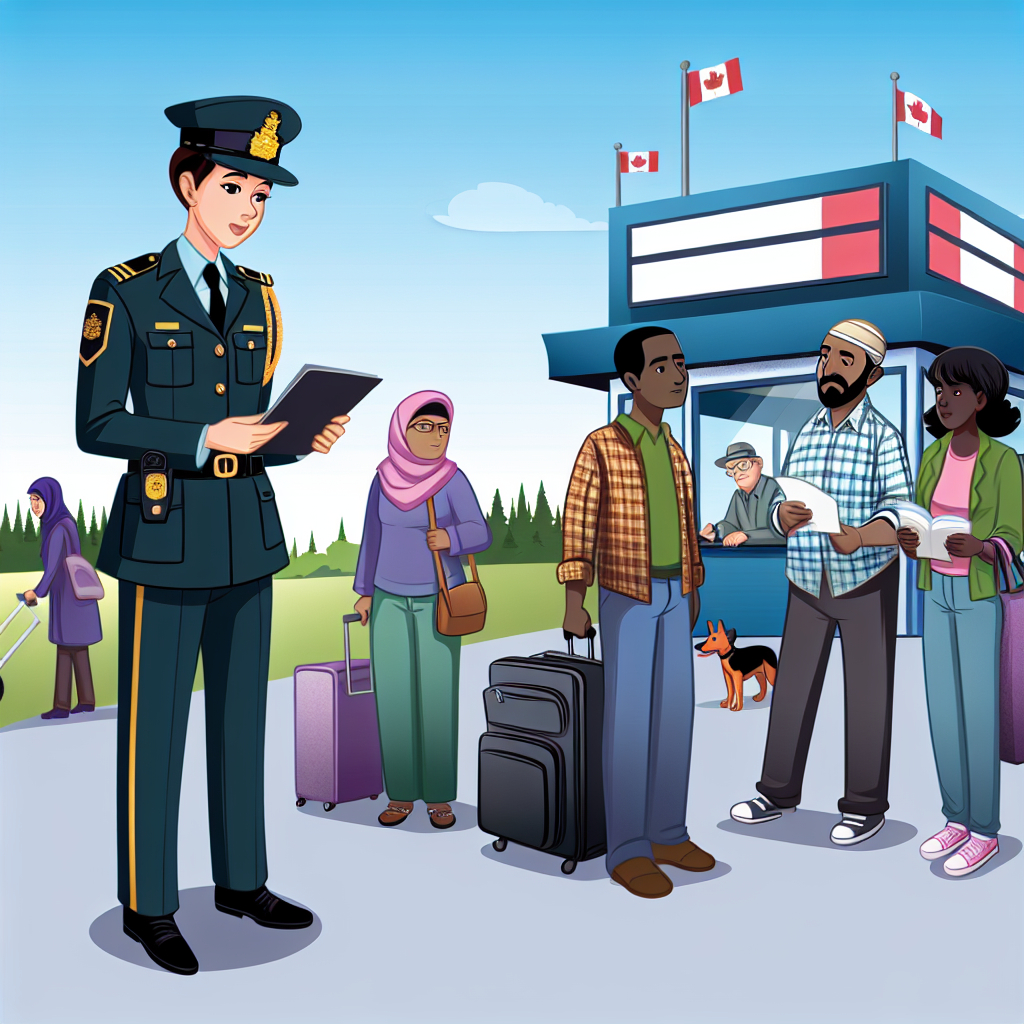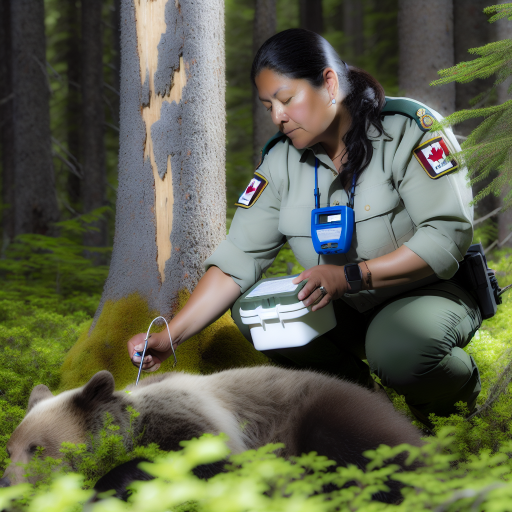Overview of Border Services and its Importance to Canada
Border services play a critical role in safeguarding Canada.
These services ensure the integrity of the nation’s borders.
They facilitate the flow of goods and people across international boundaries.
Moreover, border services protect public safety and national security.
They prevent the entry of prohibited items and individuals.
In addition, they help to combat cross-border crime and smuggling.
Furthermore, border services support Canada’s economy through trade.
They streamline customs processes, benefiting businesses and travelers alike.
Border services contribute to streamlined international relations.
By effectively managing immigration, they enhance Canada’s multicultural environment.
This diversity enriches Canadian society as a whole.
Border services are essential for security, trade, and diversity.
Key Career Roles within Border Services
Border Patrol Agent
Border patrol agents serve as the frontline defense against illegal activities.
They monitor borders to prevent unauthorized entry and smuggling.
Additionally, they engage in surveillance and apprehend violators.
This role requires strong physical fitness and analytical skills.
Customs Inspector
Customs inspectors assess imports and exports for compliance.
They ensure goods meet legal standards and tax regulations.
Moreover, they play a critical role in national security.
Attention to detail and strong communication skills are essential.
Immigration Officer
Immigration officers process applications for visas and citizenship.
They verify the status of individuals entering the country.
Additionally, they assess the eligibility of applicants based on regulations.
This position requires strong decision-making abilities.
Border Security Analyst
Border security analysts evaluate data to identify trends and threats.
Unlock Your Career Potential
Visualize a clear path to success with our tailored Career Consulting service. Personalized insights in just 1-3 days.
Get StartedThey provide insights that influence policy and operational decisions.
Analyzing intelligence reports and statistical data is crucial.
Analytical skills and attention to detail are vital in this role.
Compliance Enforcement Officer
Compliance enforcement officers ensure adherence to laws and regulations.
Their work involves investigating violations and issuing penalties.
They collaborate with various agencies to uphold legal standards.
This position demands strong investigative skills and legal knowledge.
Training Coordinator
Training coordinators develop and implement training programs for staff.
They ensure personnel are prepared for the challenges of border security.
This role focuses on improving skills and knowledge within the agency.
Facilitation and organization skills are essential for success.
Technology Specialist
Technology specialists manage and enhance security technologies.
They implement advanced systems for surveillance and data analysis.
Also, they troubleshoot equipment to maintain operational efficiency.
Technical expertise and a background in IT are beneficial.
Educational Requirements for Careers in Border Services
General High School Requirements
A high school diploma is essential for most entry-level positions in border services.
Applicants should focus on subjects like social studies and law enforcement.
These courses provide a foundation in policies and regulations.
Additionally, physical education is important for meeting fitness standards.
Post-Secondary Education Options
Many employers prefer candidates with an associate degree or higher.
Common fields of study include criminal justice, security management, or public administration.
These degrees offer specialized knowledge applicable to border services.
Furthermore, relevant internships can enhance employment prospects.
Training and Certification Programs
Various training programs are available for aspiring border service professionals.
For instance, completion of a police academy can be advantageous.
These programs typically include courses in law enforcement, ethics, and community relations.
Certification in first aid and CPR is often required as well.
Continuing Education and Specialization
Border services professionals may pursue further education to advance their careers.
Specialized training in customs, immigration, or fraud prevention can be beneficial.
Additionally, attending workshops and seminars helps in staying updated on industry standards.
Continuing education demonstrates commitment to professional development.
Skills and Competencies
In addition to formal education, specific skills are crucial for success in border services.
Strong communication skills are essential for effective interactions with the public.
Furthermore, analytical skills aid in problem-solving and decision-making.
Candidates should also be adept at using technology relevant to border security.
Internships and Volunteer Opportunities
Gaining experience through internships is highly valuable for networking and skill development.
Many border services organizations offer internships for students.
Volunteering with community organizations can also enhance your resume.
Such experiences can provide practical insights into border services roles.
Find Out More: Preparing for a Correctional Officer Interview in Canada
Skills and Competencies Needed for Advancement in Border Services
Understanding of Regulations and Policies
Professionals must grasp the regulations governing border services.
Knowledge of international laws enhances decision-making and enforcement capabilities.
Staying updated on changes in legislation is crucial for compliance.
Regular training on policy updates fosters adaptability in evolving environments.
Strong Communication Skills
Effective communication is essential in border services roles.
Employees must interact with diverse populations and authorities.
Clear articulation of information ensures compliance and facilitates cooperation.
Additionally, strong negotiation skills can help resolve conflicts swiftly.
Analytical and Problem-Solving Abilities
Analytical skills are pivotal in assessing risks and vulnerabilities.
Individuals must evaluate complex situations quickly and accurately.
Problem-solving abilities can lead to effective resource allocation and management.
Creative approaches to challenges can enhance operational efficiency.
Technical Proficiency
Familiarity with technology in border security systems is necessary.
Employees should be adept at using surveillance and identification tools.
Advanced data analysis skills improve border control mechanisms.
Regular training on new technologies ensures continuous improvement.
Teamwork and Collaboration
Border services require a collaborative approach among various stakeholders.
Building relationships with law enforcement and governmental agencies is important.
Cross-functional teamwork enables more effective resolution of issues.
Respectful collaboration fosters a positive work environment.
Cultural Competency
Cultural awareness is vital in a diverse border environment.
Understanding different backgrounds enhances service delivery and compliance.
Training in cultural sensitivity helps avoid misunderstandings and conflicts.
Promoting inclusivity strengthens community relations and trust.
You Might Also Like: Physical and Mental Requirements for Border Services Work
Networking and Professional Development in Border Services
Importance of Networking
Networking plays a critical role in border services careers.
It helps professionals connect with peers and industry leaders.
Building relationships opens doors to job opportunities.
Furthermore, networking provides access to valuable resources.
Effective Networking Strategies
Utilize social media platforms to engage with industry groups.
Attend conferences and workshops focused on border services.
Join professional organizations related to border management.
Participate in online forums to share insights and knowledge.
Professional Development Opportunities
Continuous education is essential in border services careers.
Consider enrolling in courses specific to border security.
Certifications can enhance credibility and skills.
Mentorship programs provide guidance from experienced professionals.
Staying Informed and Updated
Read industry publications to stay abreast of trends.
Subscribe to newsletters that cover relevant topics.
Attend webinars to gain insights from experts.
Engaging with current research fosters informed decision-making.
Leveraging Technology in Networking
Use technology to expand your professional network.
Online platforms like LinkedIn facilitate targeted connections.
Virtual events allow participation regardless of location.
Digital communication also enables timely collaboration on projects.
The Role of Soft Skills
Soft skills are crucial for successful networking.
Effective communication fosters meaningful relationships.
Active listening enhances understanding and collaboration.
Adaptability helps navigate diverse professional situations.
Find Out More: Inside the Canadian Border Services Recruitment Process

Career Advancement Opportunities
Promotions
Border services offer numerous promotion opportunities for dedicated employees.
Individuals can progress through various ranks based on performance and experience.
For example, entry-level agents often move up to supervisory roles.
Additionally, management positions are available for those demonstrating leadership skills.
This clear pathway encourages employees to develop professionally.
Specialized Roles
Beyond standard positions, specialized roles are crucial in border services.
These positions require specific expertise in areas like customs enforcement.
Officers can also focus on immigration law and procedure.
Furthermore, some specialize in cargo inspection and risk assessment.
Such roles often come with higher pay and additional responsibilities.
Training and Development
Continuous training is essential for career growth in border services.
Agencies provide various programs to enhance skills and knowledge.
Workshops and seminars help agents stay current with policies and technologies.
Mentorship programs also guide junior staff toward advancement.
Investing in personal development pays off in job performance and prospects.
Networking Opportunities
Networking plays a vital role in career advancement.
Border services employees can attend conferences and workshops.
These events foster connections with industry professionals.
Additionally, building a network often leads to new job openings and promotions.
Active engagement in professional communities can be immensely beneficial.
Uncover the Details: Ombudsmen as Advocates for Fair Treatment in Society
Internship and Co-op Programs in Border Services
Understanding the Importance of Internships
Internships provide essential experience for students in border services.
They allow individuals to apply theoretical knowledge in practical settings.
Moreover, internships help build professional networks in the field.
Available Opportunities
Many organizations offer internships in border services.
For instance, the U.S. Customs and Border Protection (CBP) has internship programs.
Other agencies, such as the Border Patrol, also provide valuable opportunities.
Eligibility Criteria
Typically, internships require students to be enrolled in relevant programs.
Moreover, candidates often must maintain a specific GPA to qualify.
Background checks may be necessary due to the sensitive nature of the work.
Application Process
The application process generally includes submitting a resume and cover letter.
In addition, candidates may need to provide references from professors or employers.
Interviews are also a common step in securing an internship position.
Skills Developed Through Internships
Internships help develop various critical skills in border services.
For instance, analysis of border security measures is a key focus.
Additionally, students learn about dispute resolution and communication techniques.
These practical experiences prepare interns for full-time roles in the future.
Benefits of Co-op Programs
Co-op programs offer a blend of academic learning and work experience.
These programs usually alternate between classroom instruction and hands-on work.
As a result, participants gain a comprehensive understanding of border services.
Finding Co-op Opportunities
Universities often partner with organizations in the border services sector.
Students can consult career services for assistance in locating co-op placements.
Networking with professionals can also yield valuable opportunities.
Success Stories
Many professionals started their careers through internships and co-op programs.
For example, Maria Jenkins secured a role at the Department of Homeland Security.
Through her internship, she gained insights and connections that propelled her career.
Such stories illustrate the effectiveness of these programs in launching careers.
Future Trends and Opportunities in Border Services Careers
Growing Demand in Border Security
Border services careers are experiencing increased demand worldwide.
Governments recognize the need for enhanced security measures.
As a result, there are more job openings in this field.
Career opportunities extend from law enforcement to administrative positions.
Technological Advancements
Technology is reshaping border services significantly.
Automation and artificial intelligence are becoming integral in operations.
Professionals skilled in tech will find numerous opportunities.
These advancements improve efficiency and effectiveness in border control.
Intergovernmental Cooperation
Increased collaboration among countries is a notable trend.
Shared resources and information enhance border security measures.
Professionals will have opportunities to work on international teams.
This presents a chance to gain valuable cross-cultural experience.
Specialization in Customs and Trade
With globalization, customs and trade roles are expanding.
Experts in compliance and trade regulations are in high demand.
Knowledge of international trade agreements is a valuable asset.
Professionals can focus on specific industries or regions for niche opportunities.
Career Mobility and Advancement
Career paths within border services offer mobility and growth.
Positions can range from entry-level to executive roles.
Continuous education and training are essential for advancement.
Networking within the industry can also open doors to new roles.
Focus on Diversity and Inclusion
The border services sector is increasingly focusing on diversity.
Organizations are seeking a workforce that reflects society’s diversity.
Various backgrounds and perspectives enrich decision-making processes.
This shift provides opportunities for a broader range of applicants.




